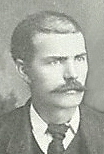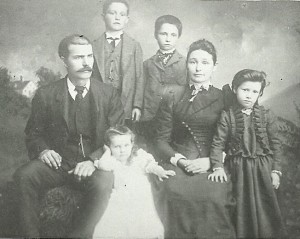 My husband, Bob Schulenberg’s 2nd great grandfather, Benjamin Franklin DeGood was a blacksmith in Galena, Kansas in 1900. He and his two oldest sons ran the business together, as often happened in families. If the parents were farmers, often so were the children. So in this case, because their dad was a blacksmith, William and Clyde grew up in the trade, and began working with him. In 1900, Galena was a town of 10,155 people…the largest population it had before or after that time. The railroad established the territory of Galena in 1871, but the town wasn’t established until the discovery of lead there in the spring of 1877. As with any mining operation back then, there were other occupations that became necessary, blacksmiths being one of them.
My husband, Bob Schulenberg’s 2nd great grandfather, Benjamin Franklin DeGood was a blacksmith in Galena, Kansas in 1900. He and his two oldest sons ran the business together, as often happened in families. If the parents were farmers, often so were the children. So in this case, because their dad was a blacksmith, William and Clyde grew up in the trade, and began working with him. In 1900, Galena was a town of 10,155 people…the largest population it had before or after that time. The railroad established the territory of Galena in 1871, but the town wasn’t established until the discovery of lead there in the spring of 1877. As with any mining operation back then, there were other occupations that became necessary, blacksmiths being one of them.
Benjamin and his family were living in Nebraska, when Bob’s great grandmother, Nellie DeGood Knox was born in Springfield on October 6, 1887, but by the birth of her younger brother Ernest on December 31, 1892 the family was living in Columbus, Kansas. By the December 9, 1898 birth of Benjamin’s youngest daughter, Beulah, the family was living in Galena, Kansas. Then in the 1900 census, Benjamin and his two eldest sons had a blacksmith shop in Galena.
I have to wonder what it was like to be a blacksmith in the 1900s. Cars had made their first appearance on the scene in 1893, and while I’m sure many people were sure they were a passing fad that was less than safe. It’s also quite possible that they were too expensive for the average person, but as a blacksmith, I have to wonder if Benjamin could see the writing on the wall. The days of the blacksmith having steady work were numbered. Nevertheless, he had to continue to do the job he knew as long as there was work to do.
At some point after the untimely deaths of Benjamin’s youngest daughter, Buelah and son,  Theodore, both of whom died as young children, and possibly because of the declining need for blacksmith services, or maybe due to declining health, Benjamin moved the family that was still at home, to Polk, Missouri. I have not found any real indication of declining health, but given the fact that blacksmiths in those days were exposed to asbestos, before we knew of the dangers, I have to think that a man who dies at 58 years of age, even as early as 1907, must have had something major going on. Lung diseases caused by asbestos would definitely qualify. I would think that the life of a blacksmith would be a hard one in every way, and when it brought with it an early death due to the occupational health hazards, it became an occupation I wouldn’t want my kids to go into…even if it was the family business.
Theodore, both of whom died as young children, and possibly because of the declining need for blacksmith services, or maybe due to declining health, Benjamin moved the family that was still at home, to Polk, Missouri. I have not found any real indication of declining health, but given the fact that blacksmiths in those days were exposed to asbestos, before we knew of the dangers, I have to think that a man who dies at 58 years of age, even as early as 1907, must have had something major going on. Lung diseases caused by asbestos would definitely qualify. I would think that the life of a blacksmith would be a hard one in every way, and when it brought with it an early death due to the occupational health hazards, it became an occupation I wouldn’t want my kids to go into…even if it was the family business.


Leave a Reply